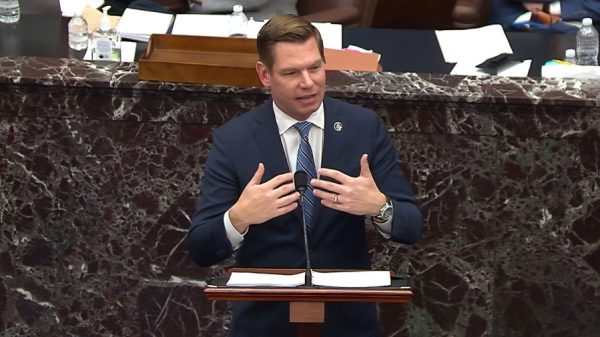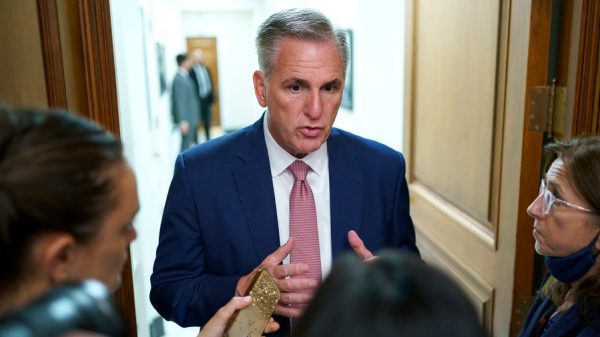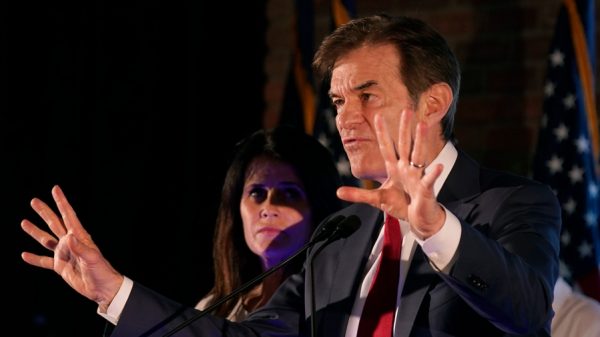Republican lawmakers are fuming about the large boost in funding for the IRS included in the $400 billion tax, health care and climate package passed by Democrats in the Senate over the weekend.
The bill provides nearly $80 billion to strengthen the IRS, more than half of which will go specifically to increased enforcement efforts such as audits. Twenty-five billion will go toward operational support, nearly $5 billion will go toward new technology and $3 billion will go to services for taxpayers, like making IRS agents available to answer questions over the phone.
“The Democrats’ reckless IRS funding increase would raise enforcement funding by nearly 70 percent above what IRS is currently projected to get,” Republican Sen. Mike Crapo (Idaho), ranking member of the Finance Committee, said of the bill on the Senate floor over the weekend.
During the extended voting session of the Senate that lasted well into Sunday, Crapo unsuccessfully filed an amendment to the bill to explicitly prevent the IRS from using the additional enforcement funding on taxpayers who earn less than $400,000 per year.
While the amendment was shot down by Democrats in the Senate, IRS chief Charles Rettig wrote identical letters to the House and Senate last week stressing that the new enforcement funding would comply with an order from the Treasury Department to make sure that audit rates of people making less than $400,000 a year would not rise.
“These resources are absolutely not about increasing audit scrutiny on small businesses or middle-income Americans,” Rettig wrote in an Aug. 4 letter. “As we’ve been planning, our investment of these enforcement resources is designed around the Department of the Treasury’s directive that audit rates will not rise relative to recent years for households making under $400,000.”
Rettig argued that wealthy taxpayers and large corporations are often able to manipulate the tax code by employing large and sophisticated legal teams that are beyond the reach of average taxpayers.
“The integrity and fairness of our tax administrative system relies upon the ability of our agency to maintain a strong, visible, robust enforcement presence directed to these and other similarly situated taxpayers when they are noncompliant,” he wrote.
Despite Rettig’s reassurances, House Ways and Means Committee ranking member Kevin Brady (R-Texas) expressed doubt that the agency would be able to keep its word and focus on rich taxpayers.
“They can’t target just the wealthy. Frankly, they do get targeted today,” Brady said on the Fox News Channel on Monday. “But there’s simply so many more IRS agents that will be unleashed on the American public, and of course it’s going to land on those Walmart shoppers and middle-class families.”
Republicans have stated that the funding boost is going to be used to hire 87,000 new IRS agents. The number is likely speculative, and was picked up after the Republican National Committee cited a figure from the right-wing advocacy group Americans for Tax Reform.
“There are a lot of bad things in this bill. But few are worse than the proposal by Democrats in this bill to double the size of the IRS and create 87,000 new IRS agents,” Sen. Ted Cruz (R-Texas) said in a Monday statement. “I guarantee you citizens in every one of our states, if you ask them, what do they want, they don’t want 87,000 new IRS agents.”
In a press conference held Tuesday with South Carolina Gov. Henry McMaster, Sen. Lindsey Graham (R-S.C.) slammed the IRS funding provision in the Inflation Reduction Act as a mechanism of government overreach.
“If you think the federal government is out of control now, God help us when you get 87,000 new IRS agents who are looking under every rock and stone to get money out of your pocket,” he said.
Indeed, the agency is now in the process of a hiring spree, but it’s unrelated to the Democratic legislation. The IRS announced a plan earlier this year to hire 10,000 new IRS agents over the next two years to help it reduce a huge backlog of tax returns initially caused by shutdowns during the pandemic.
Analysts say the actual legislative language of the Democrats’ bill is somewhat open-ended on exactly how the funds for increased enforcement need to be spent.
“The bill is fairly vague on expectations for the IRS’s spending with the increased enforcement budget,” Tax Notes contributing editor Marie Sapirie wrote in an Aug. 4 note. “It lists ‘necessary expenses for tax enforcement activities,’ as well as legal and litigation support and enforcement of criminal statutes regarding tax law violations.”
The total additional funding works out to roughly $8 billion a year for an agency that in 2021 had expenditures of only around $14 billion.
The funding will reverse a long-term downward trend on resources for the agency that began well before the pandemic threw a wrench into IRS operations.
IRS funding and staffing decreased through nearly all of the 2010s. From 2010 to 2018, IRS data shows that funding for the agency decreased from $14.36 billion to $11.43 billion, a decline of 20 percent in less than a decade.
Over the same period, the number of IRS employees decreased more than 22 percent, from 95,000 in 2010 to 74,000 in 2018.
These reductions have resulted in far fewer audits. A May report from the Government Accountability Office (GAO) found that during the 2010s, audit rates of individual income tax returns fell from 0.9 percent to 0.25 percent, with the audit rates for wealthier taxpayers dropping more sharply than in other tax brackets.
“Internal Revenue Service (IRS) officials attributed this trend primarily to reduced staffing as a result of decreased funding,” the GAO report found. “Audit rates decreased the most for taxpayers with incomes of $200,000 and above. According to IRS officials, these audits are generally more complex and require staff’s review. Lower-income audits are generally more automated, allowing IRS to continue these audits even with fewer staff.”
Such discrepancies drew criticism from Democrats, who have long advocated for better resourcing of the IRS.
“There are many reports showing that the IRS is auditing low-income families at a much higher rate than high-income taxpayers,” Ways and Means Committee member Rep Bill Pascrell (D-N.J.) said in a Ways and Means subcommittee hearing in May. “Specifically, data shows that a taxpayer with income under $25,000 is twice as likely to be audited than someone earning between $200,000 and $500,000. That disparity is an outrage.”
“I understand that the IRS justifies its auditing record on its staff limitations,” Pascrell added. “I know that the IRS has a difficult time operating after Republicans have spent a decade slashing IRS funding to sabotage tax enforcement against the rich.”
House Ways and Means Committee Chairman Richard Neal (D-Mass.) has also frequently argued for greater funding for the IRS.
“For decades, Republicans have starved the IRS of funding, and now American taxpayers are paying the price,” Neal said in a statement back in February. “The IRS needs greater support to carry out its most essential functions, like processing tax returns, enforcing the tax code, and closing the tax gap. Without resources from Congress to update its woefully out-of-date technology, the agency simply cannot operate at the level American taxpayers expect.”
That $80 billion funding boost for the IRS is projected to raise around $204 billion in revenue, for a net savings of $124 billion over the next decade.
The funding also includes $15 million for a task force on developing a free, direct e-file tax return system run by the IRS, which analysts say represents a “major development” for an agency that has long maintained a sympathetic relationship with the private tax preparation industry led by giants like Intuit and H&R Block.
“Under the bill, the IRS has nine months to set up a task force to produce a report on how it would create and operate a free, direct e-file system, including what the system would cost to administer,” Tax Notes’s Sapirie wrote.

































